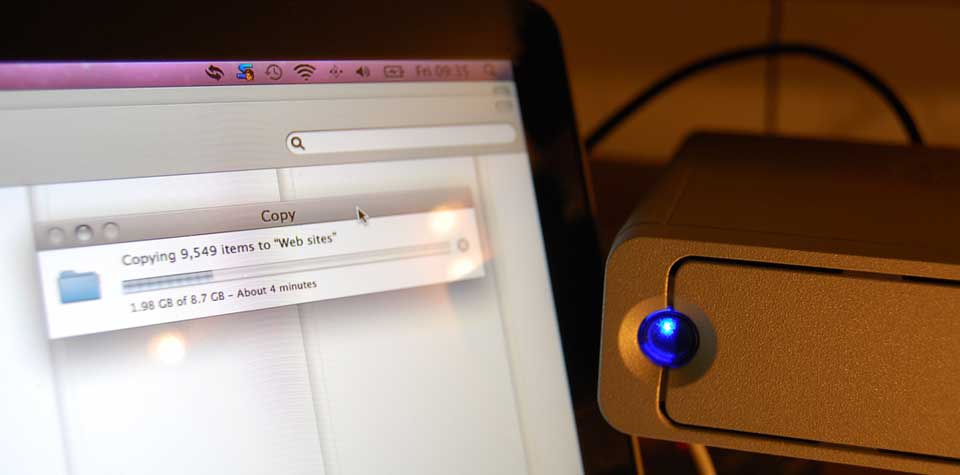Backup schedule
If you have data that is essential to your employment or studies, you must back it up regularly. This could mean immediately you have finished creating or editing data, or at the end of each working day.
Server based work place systems are usually configured to backup the days data every night, but it is also possible a system may have a RAID arrangement of disks which duplicates data as it is saved.
For individuals and students, a personal backup system will be the norm and will almost certainly take the form of an external hard drive or online storage provider system. It is important that the system is physically remote from the computer (ie not just a second internal hard drive) and secured in some way. Automatic scheduled backup programmes can be employed or an automated reminder in a calendar to remind you to perform a manual backup.
How many backups?
Try to keep at least 2 versions of essential data in at least 2 different locations and archive data no longer required on a daily basis. If one backup fails replace it immediately. These backups might be ...
- Internal hard drive
- External hard drive
- Archive (CD-R, DVD-R etc)
Manual & automatic
Backing up manually will give you total control but you risk missing files and forgetting to backup altogether unless you have a robust reminder system in place. Automatic systems reduce this risk but bring with them their own problems when a system you rely on fails. Also, they will require your computer to be on and attached to the backup device at the time of scheduled backup, and this is becoming increasingly less convenient as more and more of us move to mobile devices.
Version control
If you have an incremental automated backup system you may be able to set it to store dated versions of your data. Remember that such systems will often erase early versions as storage capacity is exceeded, so ensure you have an archiving strategy in place.
If you are backing up data manually, then you can simply create dated sub folders to organise versions.
Security
Think carefully about how sensitive your data is and if it should be encrypted. For most of us it may only be necessary to encrypt financial and legal data, but whatever you do, ensure you have made provision for next of kin to be able to access necessary data in the event of your death.
Our recommendations for individuals and students
- Always keep at least 2 versions of essential data in 2 different locations.
- Backup essential data at the end of each working day or every week to a USB 2, FireWire 800 or eSATA external hard drive or a secure and well known online system. You may wish to physically secure the drive with a Kensington lock.
- Do NOT rely on vulnerable USB memory sticks alone. They are designed for transfer and easy access, not long term storage.
- Do NOT rely solely on online storage systems or emailing files to yourself. These services are provided by commercial businesses which are vulnerable to cyber attack and can stop trading.
- Web design students could ftp their local sites and source files to a hosting server.
- Archive essential data to CD-R or DVD-R and check if cloning is necessary every 4-5 years.
- Only store data on email servers as a short term solution.
Technologies and processes evaluation
| Technology / process | Capacity (typical) | Transfer/write speeds | Term | Average life span | Robustness | Security |
|---|---|---|---|---|---|---|
| USB 2 external drive | 500Gb-2Tb | Medium | Medium | 4 years | Medium | Good if encrypted |
| FireWire 400 external drive | 500-800GB | Medium | Medium | 4 years | Medium | Good if encrypted |
| FireWire 800 external drive | 500Gb-2Tb | Fast | Medium | 4 years | Medium | Good if encrypted |
| eSata external drive | 500Gb-2Tb | Very fast | Medium | 4 years | Medium | Good if encrypted |
| RAID drive(s) | 1Tb + | Very fast | Long | 4 years | Good | Good if encrypted |
| USB memory stick | 2-32Gb | Slow / medium | Short | ? | Poor | Good if encrypted |
| 40Mb + | Slow | Short | ? | Poor | Good if encrypted | |
| Online / Cloud | 1Gb + | Slow | Long | Unlimited | Excellent | Depends on provider |
| File server (ethernet) | No limit | Very fast | Long | Unlimited | Excellent | Depends on provider |
| FTP | No limit | Slow | Long | Unlimited | Excellent | Medium |
| CD-R | 640-700Mb | Medium | Medium | 8 years | Good | Poor |
| DVD-R (single layer) | 4.3-4.4Gb | Medium | Medium | 5 years | Medium | Poor |
| Blu-Ray-R (single layer) | 25Gb | Medium | Medium | 5 years | Medium | Poor |
| Tape | 200Mb-200Gb | Medium | Long | 10-15 years | Good | Poor |

